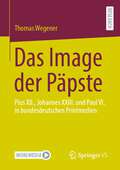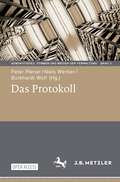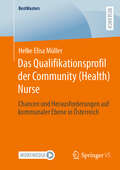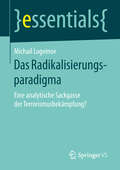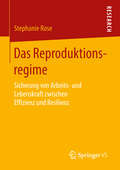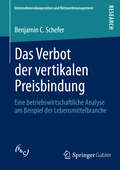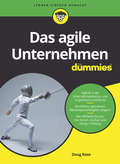- Table View
- List View
Das Image der Päpste: Pius XII., Johannes XXIII. und Paul VI. in bundesdeutschen Printmedien
by Thomas WegenerWie jede öffentlichkeitssuchende Institution oder Person legen auch die katholische Kirche und ihre Päpste großen Wert auf das eigene Image. Dabei weicht die intendierte Selbstdarstellung oftmals von der medialen Wahrnehmung ab oder steht ihr sogar diametral entgegen. Ganz gleich ob Pius XII. als „Hitlers Papst“, Johannes XXIII. als „Revoluzzer“ oder Paul VI. als „Antipillenpapst“ – es existieren eine Fülle von außen zugetragener printmedialer Papst-Images, deren Entstehung, Verlauf und Brüche es in diesem Buch mithilfe einer mediensemiotischen, textbasierten Methodik auszumachen und nachzuzeichnen gilt.
Das Individuum der Sozialen Arbeit: Ein Beitrag zur Soziologie der Sozialen Arbeit
by Marcel KrebsDie Evolution von Gesellschaft führt zu unterschiedlichen Differenzierungsformen, die immer auch als Neu-Arrangierung des Verhältnisses gelesen werden kann, welches die Gesellschaft zum Individuum einrichtet. Diese These wird im vorliegenden Buch mittels zweier Studien entlang der Werke von Émile Durkheim und Niklas Luhmann ausführlich ausgearbeitet. Beiden theoretischen Zugängen ist gemein, dass sie die Individualität des «modernen» Individuums nicht als Kompositum der Gesellschaft begreifen, vielmehr hat das Individuum seinen Standort in sich selbst und somit ausserhalb der Gesellschaft. Trotz dieser extrasozietalen Verortung bleibt Individualität gesellschaftlich verursacht, Individuen sind für die Ermöglichung und den Erhalt ihrer Individualität konstitutiv auf soziale Systeme und Inklusion angewiesen.Die Soziale Arbeit findet ihr gesellschaftliches Bezugsproblem in diesem Sachverhalt, indem sie Individualität als Kehrseite partieller Multiinklusion reflektiert und als bearbeitbare Grösse betrachtet. Ihr geht es – zumindest dann, wenn sie mehr will als nur das biologische Überleben der «Überflüssigen» zu verwalten – um das Arrangement der Inklusionen und hier um die Frage, wie Individualität auf eine gerechte Weise ermöglicht, entwickelt und stabilisiert werden kann.
Das Interpretative Paradigma: Eine Einführung
by Reiner KellerDas Buch führt in die Grundlagen soziologischer Theorie- und Forschungsperspektiven des Interpretativen Paradigmas ein. Mit diesem Begriff sind Ansätze bezeichnet, in denen die Fähigkeiten und Notwendigkeiten des Menschen, sich Welt deutend und handelnd zu erschließen, zum Ausgangspunkt der Analyse - meist in Gestalt qualitativer Sozialforschung - gemacht werden. Soziologie wird hier - schon lange vor den Cultural Studies - als ,Kulturwissenschaft' begriffen und betrieben.
Das Interview: Grundlagen und Anwendung in Psychologie und Sozialwissenschaften (Basiswissen Psychologie)
by Nora-Corina Jacob Karl-Heinz RennerDieses praxisnahe Lehrbuch bietet eine verständliche Einführung in die Grundlagen und Anwendung des Interviews – des in der Psychologie am häufigsten eingesetzten Instruments zur Datenerhebung. Konzeption, Durchführung und Auswertung von Interviews zählen deshalb zu den diagnostischen Routinetätigkeiten, die im Studium der Psychologie vermittelt werden – z.B. in Form eines Seminars, für welches das vorliegende Buch hervorragend als Begleitlektüre geeignet ist. Aber auch Forschende sowie Praktikerinnen und Praktiker finden hier hilfreiche Grundlagen und Tipps zur praktischen Durchführung von Interviews.
Das KOKO-Prinzip: KOnflikt und KOoperation - das unzertrennliche Paar
by Niki Harramach Nina Veličković Manfred KohlheimerDer ungeliebte Bruder KOnflikt genießt viel mehr Aufmerksamkeit als die viel beliebtere Schwester KOoperation. Pervers genug, oder? Im Endeffekt sind es aber die beteiligten Parteien, die entscheiden, ob in einer konkreten Situation mehr konfligiert oder kooperiert wird – und auch in welchem wie immer balancierten Ausmaß. Wenn das KOKO-Prinzip nicht ausreichend und rechtzeitig im Bewusstsein aller beteiligten Parteien verankert ist und in der KOKO-Regelung nicht entsprechend berücksichtigt wird, ist eine nachhaltig erfolgreiche Regelung der KOKO-Situation eher ein Glücksfall (meist das Gegenteil) als das Ergebnis einer professionellen Vorgangsweise.Weil die Aufmerksamkeit erwiesener Maßen mehr auf den KOnflikt- als den KOoperationscharakter der Situation gerichtet ist, müssen alle beteiligten Parteien zuerst die mögliche KOop-Seite durchexerzieren! Das ist ungewohnt aber notwendig, um dem evidenten KOnflikt-Bias zu entgehen.Dieses Buch ist kein Friedensbuch, aber auch keine bloße Kampfanleitung. Es folgt dem Grundsatz: „Wer den Kampf nicht kann, kann den Frieden nicht haben!“
Das Konzept „Starke Sprache“: Wie Sie mit klaren, wirksamen Formulierungen Ihre Ziele erreichen (essentials)
by Sven Pastoors Lars MeyerWer etwas Interessantes zu sagen hat, dem hören sowohl Kunden als auch Kollegen gerne zu. Die Art und Weise, wie wir kommunizieren, ist somit entscheidend für unseren beruflichen und privaten Weg. Zudem hängt das Maß, wie kompetent und glaubwürdig uns unsere Gesprächspartner einschätzen, maßgeblich vom Gebrauch unserer Sprache ab. In sechs Kapiteln vermitteln die Autoren in diesem essential ihren Lesern die Grundlagen starker, wirksamer Sprache. Der Fokus liegt dabei auf einer klaren und deutlichen Ausdrucksweise. Dies ist eine wichtige Voraussetzung für erfolgreiches Kommunizieren, Verhandeln und Diskutieren.
Das Mediensystem Deutschlands: Strukturen, Märkte, Regulierung (Studienbücher Zur Kommunikations- Und Medienwissenschaft Ser.)
by Klaus BeckDiese Einführung bietet eine historisch fundierte (ab 1945) systematische Darstellung der Grundstrukturen des bundesdeutschen Mediensystems und seiner kommunikationspolitischen Genese, insbesondere der ökonomischen, rechtlichen und technischen Grundlagen und Funktionsweisen der Medien der öffentlichen Kommunikation Printmedien, Rundfunk, Film, Online-Medien) sowie der medien-übergreifenden Strukturen/ Rahmenbedingungen (Nachrichten-, PR- und Werbeagenturen) sowie TK-Dienstleister. Darüber hinaus werden komparatistische Bezüge zu den Mediensystemen Österreichs und der Schweiz sowie Basisinformationen zu diesen beiden Mediensystemen hergestellt.
Das Mediensystem Deutschlands: Strukturen, Märkte, Regulierung (Studienbücher zur Kommunikations- und Medienwissenschaft)
by Klaus BeckDiese Einführung bietet eine historisch fundierte (ab 1945) systematische Darstellung der Grundstrukturen des bundesdeutschen Mediensystems und seiner kommunikationspolitischen Genese, insbesondere der ökonomischen, rechtlichen und technischen Grundlagen und Funktionsweisen der Medien der öffentlichen Kommunikation Printmedien, Rundfunk, Film, Online-Medien) sowie der medien-übergreifenden Strukturen/ Rahmenbedingungen (Nachrichten-, PR- und Werbeagenturen) sowie TK-Dienstleister. Darüber hinaus werden komparatistische Bezüge zu den Mediensystemen Österreichs und der Schweiz sowie Basisinformationen zu diesen beiden Mediensystemen hergestellt.
Das Mensch-Tier-Verhältnis: Eine sozialwissenschaftliche Einführung
by Renate Brucker Melanie Bujok Birgit Mütherich Martin Seeliger Frank ThiemeDas Mensch-Tier-Verhältnis ist in modernen Gesellschaften durch Ambivalenzen gekennzeichnet. Auf der einen Seite als Ding und Material benutzt und fabrikmäßig aufbereitet, werden Tiere andererseits als eigenständige Subjekte und Teil konkreter Sozialbeziehungen mit Menschen wahrgenommen. Das Buch soll - erstmals als sozialwissenschaftliche Einführung - einen Querschnitt der aktuellen Forschung zum Mensch-Tier-Verhältnis bieten. Die Autorinnen und Autoren folgen dabei ihren unterschiedlichen Schwerpunkten und veranschaulichen u. a. aus sozialhistorischer, kulturwissenschaftlicher und herrschaftssoziologischer Perspektive die Breite dieses Themas und seine Verflochtenheit mit anderen Forschungsgebieten.
Das Phänomen Vertrauen in der Einzelberatung: Erkenntnisse zu und Bedeutung von Vertrauen in systemischer Einzelberatung, Coaching, Supervision, Seelsorge und ähnlichen Settings (essentials)
by Esther KuhnVertrauen ist nicht nur in Beratungssettings, sondern auch in allen zwischenmenschlichen Beziehungen essenziell. Dieses essential bietet eine fundierte und präzise Einführung in das Phänomen Vertrauen aus systemischer Sicht. Zudem wird entlang den Phasen eines Beratungsprozesses die Bedeutung von Vertrauen analysiert und entfaltet. Die Erkenntnisse werden für die beraterische Praxis fruchtbar gemacht. Nach diesem Essential ist klar, warum Vertrauen ein Schlüssel für Beratung ist.
Das Prinzip Glück (essentials)
by Robert HettlageRobert Hettlage umreißt in seinem Essential, was es mit dem ,,großen", vernunftgesteuerten Glück auf sich hat. Dass alle Menschen nach dem Glück streben, gilt als selbstverständlich. Macht, Schönheit, Reichtum und Anerkennung stehen zwar als Ziele hoch im Kurs, bedürfen aber eines langen Atems und/oder sind schwer zu beeinflussen. In der modernen Welt scheint also eine Ratlosigkeit vorzuherrschen, die keinen anderen Ausweg weiß, als jeden Menschen individuell zum Schmied seiner Zufriedenheit und seines Wohlergehens zu erklären. Dadurch wird der Weg zu einer langen Tradition der Glücksphilosophie verbaut, die nicht bei der seelischen Befindlichkeit ansetzt, sondern bei der inneren, ,,notwendigen und hinreichenden" Qualität der Glücksgüter. An diesen Qualitäten und der trainierten Haltung ihnen gegenüber (Tugenden) bemisst sich die Lebenskunst. Obwohl Max Weber in seinen soziologischen Analysen die Entwicklung zu modernen Kontingenz, Wertpluralität und Individualität für unabwendbar und schicksalhaft erklärt, zeigen seine Erörterungen zur ,,Lebensführung", dass diese an das vormoderne Konzept der Lebenskunst anschließen kann.
Das Protokoll (AdminiStudies. Formen und Medien der Verwaltung #2)
by Niels Werber Peter Plener Burkhardt WolfProtokolle stehen im Zentrum unterschiedlichster (interaktiver, papierener oder auch elektronischer) Verwaltungsoperationen: Sie halten ebenso fest, was gesagt und beschlossen wurde, wie sie festlegen, was wie zu tun ist. Sie strukturieren, regulieren und dokumentieren Sprech- und Handlungsabläufe von ministeriellen Zusammenkünften, Gerichtsterminen und anderen komplexen Arbeitsprozessen. Seit Jahrhunderten schreiben Protokolle auf und vor, was zu tun und was zu lassen ist, was als notwendig gilt oder als unwichtig und marginal. Sie filtern aus komplexen Interaktionen das heraus, was jene Vergangenheit gewesen sein wird, auf die man sich künftig bezieht. Dabei arbeiten Protokolle letztlich ein und demselben Zweck zu: dass – auf begründete und regelgeleitete Weise – überhaupt etwas entschieden wird. Vor diesem Hintergrund und mit verwaltungshistorischen und soziologischen ebenso wie medien-, kultur- und literaturwissenschaftlichen Perspektiven greift der zweite Open Access-Band der AdminiStudies drei Hauptformen dieses Verwaltungsmediums auf: Gesprächs- bzw. Verlaufsprotokolle, diplomatische und technische Protokolle.
Das Qualifikationsprofil der Community: Chancen und Herausforderungen auf kommunaler Ebene in Österreich (BestMasters)
by Helke Elisa MüllerIn diesem Buch wird das Qualifikationsprofil der Community (Health) Nurses untersucht, die seit 2022 im Rahmen eines Pilotprojekts in Österreich tätig sind. Ziel ist es, Chancen und Herausforderungen aus der Perspektive der Community (Health) Nurse zu analysieren, um den Implementierungsprozess zu optimieren. Durch qualitative Interviews mit Expert*innen wurde ermittelt, dass Community (Health) Nurses über unterschiedliche Kompetenzen verfügen, jedoch bei vorrangig benötigten Fähigkeiten Defizite vorhanden sind. Eine Anpassung des nationalen Qualifikationsprofils wird als notwendig erachtet. Die Ergebnisse weisen darauf hin, dass sowohl förderliche als auch hemmende Faktoren berücksichtigt werden sollten, um die erfolgreiche Implementierung von Community (Health) Nursing zu gewährleisten.
Das Radikalisierungsparadigma: Eine analytische Sackgasse der Terrorismusbekämpfung? (essentials)
by Michail LogvinovDie kritische These dieses essentials geht davon aus, dass das Radikalisierungsparadigma die Terrorismusbek#65533;mpfung an den Rand einer epistemischen Krise brachte. Denn es blendete zahlreiche Radikalisierungsmechanismen und -faktoren jenseits der verd#65533;chtigen Gemeinschaften aus. Vor allem aber lenkte die wahrnehmungsdominante Perspektive auf ein ideologisch-theologisches Ph#65533;nomen als ,terroristischen N#65533;hrboden' von den eigentlichen Gef#65533;hrdern, klandestinen Netzwerken und konspirativ Radikalisierten ab. So entstand das so genannte ,tunnel investigation syndrome', das die Analytiker in einigen F#65533;llen daran hinderte, terrorismusrelevante Entwicklungen zu reflektieren.
Das Recht auf sexuelle Mikrodiversität: Eine soziohistorische Untersuchung
by Felipe RankeIn diesem Buch wird die These vertreten, dass die fortschreitende Beziehung zwischen der als vielfältiges Phänomen verstandenen Sexualität und den Grund- und Menschenrechten die wichtigste strukturelle Bedingung war, die die Schwächung von traditionellen Strukturen ermöglicht hat. Der Band enthält eine Fülle von empirischen Belegen für diese These. Dazu zählt die Identifizierung einer ersten Welle der Entkriminalisierung mikrodiverser Sexualitäten in der Weltgesellschaft nach der Französischen Revolution und den Napoleonischen Kriegen durch die Einführung des Schadensprinzips als Rechtfertigung für die Strafverfolgung. Solange sexuelle Beziehungen zwischen Männern keinen objektiven Schaden verursachten, sollten sie von der Strafverfolgung ausgenommen werden. In dem Band wird auch ausführlich erörtert, wie die Ausweitung der Verfassungsgerichtsbarkeit auf nationaler und supranationaler Ebene nach dem Zweiten Weltkrieg zu einem Mechanismus zur Förderung der sexuellen Vielfalt wurde, ohne dass das politische System dabei zwangsläufig eine proaktive Rolle einnehmen musste. Dies stellt die zweite und bis heute andauernde Welle der Entkriminalisierung mikrodiverser Sexualitäten in Bezug auf deren Handlungen, Darstellungen und Zustände dar. Über 200 empirische Beispiele der Rechtsprechung aus dem lateinamerikanischen und europäischen Raum illustrieren diesen Wandel.
Das Reproduktionsregime: Sicherung Von Arbeits- Und Lebenskraft Zwischen Effizienz Und Resilienz
by Stephanie RoseDieses Buch geht der Frage nach, wie angesichts einer viel diskutierten Reproduktionskrise die alltägliche Reproduktion und Regeneration gewährleistet werden kann. Die Autorin entwickelt durch die konzeptionelle Neusortierung des Forschungsstandes das Reproduktionsregime als neues Analysekonzept. Der analytische Mehrwert des Reproduktionsregimes entsteht durch die integrierte Betrachtung von politischen Reformen, darauf gründenden personalpolitischen Maßnahmen, individuellen Bewältigungsstrategien und den dahinterstehenden, für verschiedene Beschäftigtengruppen sehr unterschiedlich ausgeprägten Ressourcen. Symptome der Reproduktionskrise sind neben der Zunahme psychischer Belastungen und Erkrankungen eine steigende Zahl erwerbsunfähiger Menschen und der Anstieg von Arbeitsausfällen. Eine nachhaltige Sicherung der alltäglichen Reproduktion scheint vielen Menschen gegenwärtig nicht mehr möglich zu sein.
Das Schweigen beenden – Beiträge zur Aufarbeitung sexuellen Kindesmissbrauchs (Sexuelle Gewalt in Kindheit und Jugend: Forschung als Beitrag zur Aufarbeitung)
by Sabine Andresen Daniel Deckers Kirsti KriegelDie Texte in diesem Band von Wissenschaftlerinnen und Wissenschaftlern, von Aktivisten und betroffenen Menschen und Journalisten widmen sich verschiedenen Aspekten der Aufarbeitung sexuellen Kindesmissbrauchs insbesondere unterschiedlichen Tatkontexten wie der Familie, dem Sport, Schulen oder den Kirchen. Sexueller Kindesmissbrauch geschieht in allen Bereichen unserer Gesellschaft, in denen Kinder aufwachsen. Dennoch ist das Thema weitgehend tabuisiert. Die Aufarbeitung sexueller Gewalt trägt dazu bei, die Gesellschaft zu sensibilisieren, vergangenes Unrecht sichtbar und die Stimmen betroffener Menschen hörbar zu machen. Der Blick in die Vergangenheit ist notwendig, um erkennen, warum die Gewalt geschehen konnte, warum Kindern nicht geholfen, weggeschaut, vertuscht und geschwiegen wurde, aber vor allem, damit wir wissen, wie wir Kinder und Jugendliche in Zukunft besser schützen können.
Das Schweigen beenden: Beiträge zur Aufarbeitung sexuellen Kindesmissbrauchs (Sexuelle Gewalt in Kindheit und Jugend: Forschung als Beitrag zur Aufarbeitung)
by Sabine Andresen Daniel Deckers Kirsti KriegelDie Texte in diesem Band von Wissenschaftlerinnen und Wissenschaftlern, von Aktivisten und betroffenen Menschen und Journalisten widmen sich verschiedenen Aspekten der Aufarbeitung sexuellen Kindesmissbrauchs insbesondere unterschiedlichen Tatkontexten wie der Familie, dem Sport, Schulen oder den Kirchen. Sexueller Kindesmissbrauch geschieht in allen Bereichen unserer Gesellschaft, in denen Kinder aufwachsen. Dennoch ist das Thema weitgehend tabuisiert. Die Aufarbeitung sexueller Gewalt trägt dazu bei, die Gesellschaft zu sensibilisieren, vergangenes Unrecht sichtbar und die Stimmen betroffener Menschen hörbar zu machen. Der Blick in die Vergangenheit ist notwendig, um erkennen, warum die Gewalt geschehen konnte, warum Kindern nicht geholfen, weggeschaut, vertuscht und geschwiegen wurde, aber vor allem, damit wir wissen, wie wir Kinder und Jugendliche in Zukunft besser schützen können.
Das Subjekt im Klang: Die spezifische soziale Funktion der Musik in der Romantik um 1800 und in der deutschen Technoszene der 1990er Jahre (Auditive Vergesellschaftungen Hörsinn - Audiotechnik - Musikerleben)
by Max IschebeckMusik ist mit unzähligen sozialen Prozessen und Situationen in unterschiedlichen Bereichen der Gesellschaft verknüpft. Dabei wird sie völlig anders eingesetzt, rezipiert und erfahren als andere Medien, etwa als die Schrift, die gesprochene Sprache oder Bilder. Vor diesem Hintergrund ist es überraschend, dass die Soziologie sich kaum für die Bedeutung der Musik in der Gesellschaft sowie für das Besondere dieses Mediums in seinem sozialen Kontext interessiert. Die Arbeit fragt deshalb in zwei Teilstudien nach der spezifischen sozialen Funktion der Musik. In der frühen Romantik und in der deutschen Technoszene der 1990er Jahre wird die Musik, so arbeitet der Autor heraus, zur Konstitution und Organisation von Subjektkulturen eingesetzt. Die Klänge sind ein Mittel zur Hervorbringung von Praxisformen und Diskurselementen, mit denen sich neue Formen des Ichs beschreiben und erproben lassen. Sowohl die Romantiker*innen als auch die Raver*innen hören das emphatisch idealisierte, kollektive Ich zudem in der Musik heraus. Sie wird so zu einem integrativen Symbol, das alle im Entstehen begriffenen Wissensgehalte und Handlungsweisen der Subjektform umfasst.
Das Verbot der vertikalen Preisbindung: Eine betriebswirtschaftliche Analyse am Beispiel der Lebensmittelbranche (Unternehmenskooperation und Netzwerkmanagement)
by Benjamin C. ScheferInfolge aktueller Entwicklungen in der Kartellrechtspraxis wird das Preisbindungsverbot derzeit wieder kontrovers unter Vertretern der Rechtswissenschaft, der Wettbewerbstheorie und der Betriebswirtschaftslehre diskutiert. Benjamin C. Schefer analysiert in diesem Zusammenhang die marketingorientierte Argumentationslinie der Münsteraner Distributions- und Handelsforschung mit Hilfe einer qualitativ angelegten, empirischen Untersuchung. Auf Basis der vorrangig in der Lebensmittelbranche gewonnenen Erkenntnisse wird am Ende eine Empfehlung abgeleitet, wie die Vertikalmaßnahme aus ökonomischer Perspektive kartellrechtlich behandelt werden sollte.
Das Verhältnis von Kriminalität und Ökonomie: Eine empirische Studie am Beispiel der Privatisierung ehemaliger DDR-Betriebe
by Ingo TechmeierDas Verhältnis von Kriminalität und Ökonomie ist weitgehend unbekannt. Ingo Techmeier analysiert im Rahmen eines qualitativen Forschungsprojekts zur Wirtschaftskriminalität anlässlich der Privatisierung ehemaliger DDR-Betriebe dieses Verhältnis. Im Rückgriff auf ökonomische und kriminologische Theoreme mit geringem empirischen Gehalt untersucht er folgende Fragen: Welche ökonomische Funktion hat kriminelles Handeln und warum ist es Teil der ökonomischen Dynamik? Welcher Zusammenhang besteht zwischen wirtschaftskriminellen Handlungen und dem unternehmerischen Zeithorizont? Wieso halten unternehmerische Akteure das Strafrecht für unverzichtbar, stellen jedoch in der Regel selber keine Strafanzeige? Der Autor beschreibt ein widersprüchliches Verhältnis, in dem sich strafrechtliche Konflikte nicht vollständig vermeiden lassen, sondern auch produziert werden.
Das Videodrama: Ein religionspädagogisches Filmprojekt im interdisziplinären Dialog (pop.religion: lebensstil – kultur – theologie)
by Julian SengelmannDas religionspädagogische und praktisch-theologische Projekt VIDEODRAMA ist ein hybrider, interdisziplinärer Ansatz, bei dem mit einer Gruppe in einem kreativen Prozess ein Film produziert wird, der im „Raum eines biblischen Textes“ entsteht. Die Teilnehmenden entwickeln diese Filmerzählung in allen Facetten einer klassischen Filmproduktion bis hin zur Premiere in einem Kino. Das VIDEODRAMA ist ein interdisziplinäres Projekt, das sich dezidiert von wissenschaftlichen Konkurrenzen und Konzeptionen loslöst. Dieses Buch begleitet exemplarisch einen solchen Prozess, entwickelt eine Theorie des VIDEODRAMAS und bringt diese mit ausgewählten aktuellen religionspädagogischen Diskussionen ins Gespräch.
Das Virus im Netz medialer Diskurse: Zur Rolle der Medien in der Corona-Krise (ars digitalis)
by Peter Zimmermann Angela KrewaniDie Corona-Krise gewinnt durch die digital-mediale Verbreitung eine beunruhigende Präsenz, der sich niemand entziehen kann. Dabei handelt es sich nicht nur um die aktuelle journalistische Berichterstattung, sondern auch um das Netz der digitalen Kommunikationen, die das Virus in verschiedenen ästhetischen Formen repräsentieren und reflektieren. Eine wichtige Rolle spielen dabei die Visualisierungen der Pandemie vom allzeit präsenten Ikon des Virus bis zu den Datengrafiken der Durchseuchung. Mit diesen Mitteln entwickelt sich ein visuelles Regime, das wiederum in die mediale Berichterstattung und die Pandemie-Kommunikation zurückwirkt.Damit reagiert das Buch auf die aktuelle Pandemie und bietet eine breitgefächerte Aufarbeitung der unterschiedlichen medialen Repräsentationen des Virus.Das Buch vertritt einen dezidiert digital-medienwissenschaftlichen Ansatz, der die Medialität des Virus und der kontroversen Diskurse der Pandemie mit ihren komplexen und heterogenen Aspekten dokumentiert und analysiert. Damit unterscheidet es sich signifikant von stärker publizistischen oder soziologisch ausgerichteten Studien.
Das agile Unternehmen für Dummies (Für Dummies)
by Doug RoseWer sein Unternehmen in Zeiten permanenten Wandels konkurrenzfähig halten will, kommt am Konzept der Agilität nicht vorbei. Was in der Softwareentwicklung und über das Projektmanagement Einzug in die Teams von Unternehmen gefunden hat, gilt inzwischen als die passende Antwort auf die Herausforderungen an das gesamte Unternehmen - schnell, innovativ und frei von festgefahrenen Strukturen auf ein verändertes Marktumfeld reagieren zu können. Doug Rose erläutert die Grundideen agiler Praktiken, erklärt Tools wie Disciplined Agile Delievery, Large Scale Scrum, Lean Product Delivery, Kanban, Scale Agile Framework und Spotify Engineering Culture und zeigt auf, für welche Art von Unternehmen und Unternehmenskultur welche Rahmenstrukturen passen - ein Start-up-Unternehmen hat nun einmal andere Voraussetzungen als eines, das sich durch starke hierarchische Strukturen definiert. Sie erfahren, wie Sie Schritt-für-Schritt agile Praktiken umsetzen und Ihr Unternehmen so fit für die kommenden Herausforderungen machen.
Das befragte Gedächtnis: Die Methodik sozialwissenschaftlicher Befragung im Lichte neurokognitiver Erkenntnisse
by Reinhard Bachleitner Martin WeichboldDas Gedächtnis und der Prozess des Erinnerns – zwei zentrale Elemente in sozialwissenschaftlichen Befragungsverfahren – sind selten thematisierte Grundlagen in der sonst breit diskutierten Befragungsmethodologie. Dieser Sammelband versucht hier Hinweise zu deren Bedeutung zu geben. Neben den grundsätzlichen Aspekten wie Einspeicherung und Abruf von Informationen, die verschiedenen endogen und exogenen Einflüssen ausgesetzt sind, werden erste empirische Studien zu einer gedächtnisbezogenen Perspektive bei Befragungen vorgestellt.
